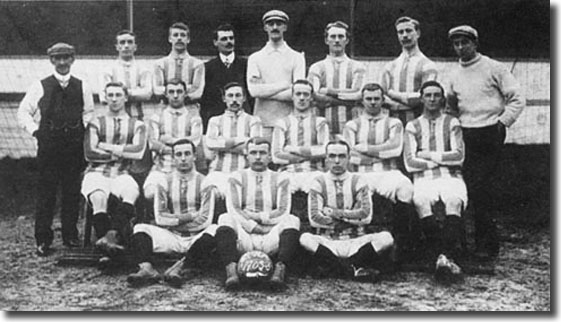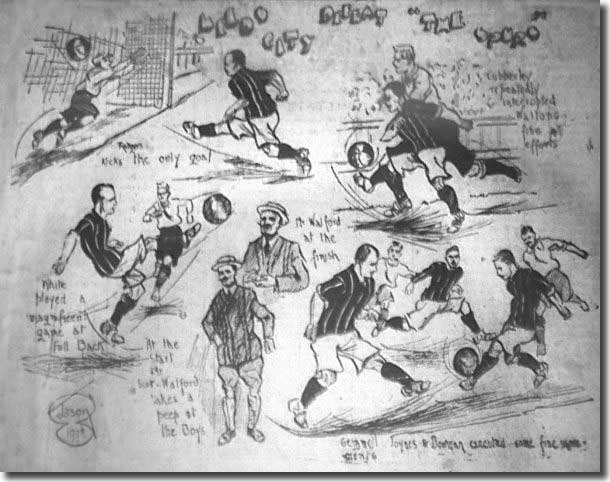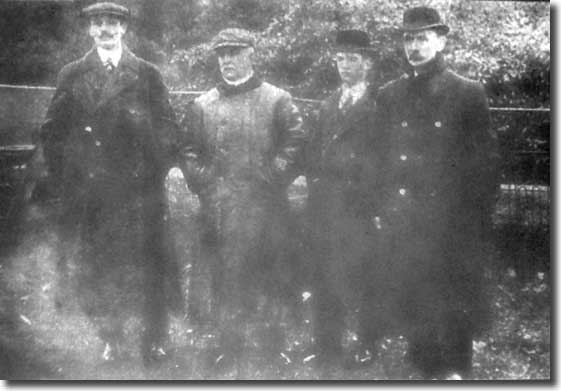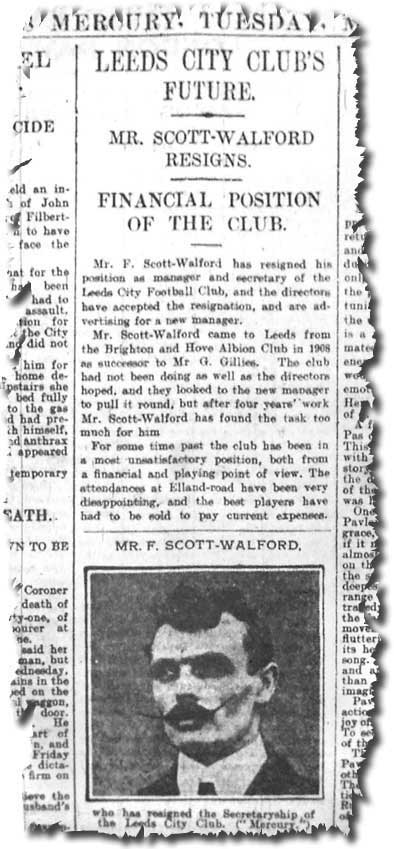 |
 |
 |
There was wide interest in the position at Elland Road when it became
available, but Scott-Walford was the directors' unanimous choice and they
quickly entered into discussions to agree terms, delighted with their
selection. It was a clear endorsement of the man's standing in the game. Scott-Walford always cut something of a flamboyant figure, with his extravagant
waxed moustache and penchant for sporting buttonholes, straw boaters,
bowler hats, caps and plus fours. But he was no one dimensional dandy
and there was enough substance to a man well schooled in football matters
to give real hope he could lead City into the Promised Land of the First
Division. Frank Scott-Walford was born in Perry Barr, Birmingham, on 5 September
1861, and trained as an engineer, giving his profession in the 1901 Census
as a fitter. He was always a keen follower of football, joining Tottenham
as an amateur goalkeeper in the late 1880s. He went on to become the club's
first registered professional and also worked for them in an administrative
capacity. Scott-Walford later played for London Caledonians, Lincoln, Small Heath
(later Birmingham) and Aston Villa. After leaving Villa he appealed successfully
to the Football Association for reinstatement as an amateur. His real
aptitude, however, always lay in management and administration, and he
is credited with the formation of the Enfield and District League. He
was an experienced referee, officiating at a number of Southern League
matches, and in September 1900 took charge of a benefit match between
Spurs and Millwall. He also enjoyed cricket and cycling. In March 1905, Scott-Walford was appointed manager of Brighton and Hove
Albion on a five-year contract. He replaced John Jackson, who had formed
the club in 1901, when they were admitted to the Second Division of the
Southern League. Within two months of Scott-Walford's arrival at the Goldstone
Ground, all but three of the players had departed the club, giving the
newcomer the not inconsiderable task of having to build a side from scratch.
He managed to do so in double quick time, enabling the club to start the
1905/06 season, but he had to pay a high price. Desperate times call for desperate measures and Scott-Walford trawled
far and wide for new men. He was accused of approaching players at other
clubs before their contracts had expired, and an FA Council was appointed
to hear the outcome of an investigation into a series of irregularities.
Twelve months later, on 2 April 1906, the Council found him guilty as
charged and announced that he would be suspended from management from
16 April until 1 August that year. Scott-Walford inspired Albion to some decent performances during his
time at the helm. In his first season, though they finished in the bottom
four, they beat Swindon Town 3-0 in the FA Cup. The following season they
improved massively, finishing third in the League. In 1908 they were back
in the lower reaches of the table, but had a spectacular 1-0 victory at
First Division Preston North End in the FA Cup before losing to Liverpool
after a replay. When Gilbert Gillies resigned as secretary-manager of Leeds City in February
1908, Scott-Walford was one of 90 applicants for the vacant post. He was
the successful candidate and happily accepted the offer of the job when
it was made on 25 March, though he still had two years left to serve on
his contract at Brighton. The City directors entered into discussions
with the Sussex club's board to arrange his release but negotiations were
protracted. Albion were reluctant to allow him to leave, and fought hard
to keep him. In the end they accepted the inevitable and promised that
when they could arrange a replacement, Scott-Walford would be allowed
to join City. Former Middlesbrough and Crystal Palace manager John Robson, who was
later in charge of Flaneur wrote in the Leeds Mercury on 30 March after Leeds lost
to Oldham: 'It will be for the new secretary-manager, Mr Scott-Walford,
to so remodel the team that next season the City record shall be more
worthy of the support the club already receives. Mr Gillies showed, when
he was appointed to the position, that it was possible for an association
manager of experience to build up a good side. Perhaps if the purchase
of players had throughout been left entirely to him Leeds City would have
had an equally good side today. Mr Scott-Walford may be given more freedom
in the matter of team building than Mr Gillies was permitted, and, if
so, Leeds City should rise out of the ruck at the bottom of the table
next season. It is too much to suggest that the club will this year attain
even the moderate position held twelve months ago, when, though they were
below their three Yorkshire rivals, they occupied tenth place in the League
table.' When Scott-Walford arrived, City were in a perilous position, fifteenth
in the table and only six points clear of the bottom two, requiring four
points from as many games to secure their Second Division status. They
earned a point at Clapton Orient on April 4 but it was a further two weeks
before they got their first win, by 3-0 at Elland Road against Stockport
County. Safety was secured the next day with the 3-1 defeat of Cup finalists
Wolves, prompting the Yorkshire Post to crow that 'Leeds were on
the up grade.' Even though funds were strictly limited, Scott-Walford was already off
in pursuit of new players, signing centre-forward Adam Bowman from Brentford
on the day of the Wolves match. Eleven of City's existing first team pool
were released at the end of the season, and Scott-Walford sought to rebuild
by recruiting from the Southern League he knew so well. Tom Rodger, Dickie
Joynes, Jimmy Burnett, David Dougal and Willie McDonald followed their
manager from Brighton to West Yorkshire during the summer. Another five
men were recruited from Southern League outfits and a letter to the Leeds
Mercury noted that 'the men who have been got together for this season
are some of the best who played in the Southern League last season, and
when they are well known to each other on the field I think they will
be a credit to the club.' It was reported that Scott-Walford's investment
that summer amounted to some £2,000. Flaneur wrote in the Leeds Mercury at the start of the 1908/09
season, 'Mr Scott-Walford City opened the campaign with a 1-0 victory against Tottenham Hotspur,
prompting Flaneur to write: 'Had a stranger with even the smallest knowledge
of the temperament of the average football crowd dropped casually into
the Elland Road ground at a quarter past five on Saturday afternoon, he
would not have considered it necessary to ask which side had won. It would
have been quite obvious to him, on seeing the smiling faces and great
enthusiasm all around, that the home team had gained the verdict. Had
he observed further that Mr Scott-Walford made a point of shaking hands
with each of the Leeds City players as the teams left the field, he might
have also deduced that the new manager of the club had passed through
an anxious hour and a half, and was very jubilant at the result. And in
both deductions he would have been correct. The new Leeds City team had
justified the faith of Mr Scott-Walford in their powers by defeating the
smart Tottenham Hotspur side by one goal to none, and the manager had
justified his position as sole selector, in the eyes of the big crowd
of nearly 20,000 people who had assembled to see this City send off. 'I know enough of the average Leeds football spectator to feel sure that
had the City team suffered defeat in this first match, Mr Scott-Walford's
experiment in putting practically a new side into the field would have
been severely criticised. The new manager took a bold sporting chance
in selecting seven players who had previously not worn the Leeds City
colours ... and the venture was justified by its success.' In the Edwardian period, the role of secretary-manager was chiefly administrative
in nature, there to act as diplomatic buffer between the directors and
the players. Selection was usually left to a committee with the manager
on occasion the hapless recipient of some perverse and nepotistic decisions
with directors basing their views on which players they most liked rather
than who would do the best job. As the Mercury reported, Scott-Walford
successfully campaigned to be given sole jurisdiction over the make up
of the team. It was reported that 'Mr Scott-Walford knows his business
and that the directors made a wise move leaving the constitution to him.' Under the new man's leadership, City were as high as sixth in the table
by December 1908, and, after special training at Ben Rhydding near Ilkley
in the New Year, they pulled off a rare win in the FA Cup at the expense
of Oldham. However, the rot set in thereafter and the Peacocks trailed
in a disappointing 12th by the end of the season. Scott-Walford brought in former Brighton centre-half Tom Morris in February
1909 after being denied when he first attempted to sign him; he proved
a superb buy, emphasising the manager's eye for talent. He was often described
as the best centre-half in the Second Division. 1909/10 was a real challenge. After an opening day victory by five goals
against Lincoln, the season yielded only a dire struggle against the need
to seek re-election. The campaign ended in turmoil when the club's shareholders
staged a revolt against the board. Scott-Walford was forced to respond
to letters of complaint as irate supporters called for an urgent It was painfully apparent that keeping the club going was the most challenging
of tasks. At an extraordinary general meeting at the beginning of September
1910, it was revealed that the bank was owed around £7,300 and there were
total liabilities of £10,800. Scott-Walford frequently had to find money
himself to cover the players' wages over the summer months and he was
owed £3,500 by the club. There were accusations from shareholders that City's directors were incompetent
and too weak to hold the club's management to account. The Leeds Mercury:
'A shareholder pointed out that even the directors admitted that there
had been bad management in the past, and what he wanted to know was what
control the new directors would have over the management, in view of the
agreement with the present manager. (Cries of "None whatever,£
and counter cries of "Order.") Mr Masser said that ... he felt
sure that the sort of men they would elect would not be the sort to be
managed by anybody. The affairs of the club would be managed by a professional
manager, but the business and capital of the company would be managed
by the directors.' One shareholder offered words of support for Scott-Walford, saying of
the management, 'They sold one man last year, and the profit on that man
paid the whole salary of the manager and his clerks. At present they had
a team that had cost them absolutely nothing, and they all believed they
had a tip top team. They were all young players, with years of football
in them, and they ought to be given a chance.' There was never much money available to add to the playing strength and
Scott-Walford had to manage on a shoe string. After his original tactic
of recruiting from the Southern League, he later moved on to seeking out
raw and unproven talent from Ireland; in 1909 he came up trumps by signing
Billy Halligan and Tom Mulholland and in 1910 he returned with Mick Foley,
Joe Enright, George Cunningham, Alec Creighton and the gifted Billy Gillespie. Gillespie was the pick of all the signings that Scott-Walford made for
Leeds. The Irishman was on the verge of joining Linfield until the City
manager began discussions with him. He quickly persuaded him to turn professional
and throw his lot in with the Elland Road club. Gillespie never fully
realised his potential with City but became a major star when he moved
on to Sheffield United. Scott-Walford addressed his new men in the club programme for the opening
game of the 1910/11 season: 'Should your efforts deserve success, and
it is denied you, we shall extend our sympathy, when you do badly we shall
still think you have done your best.' It was a hollow promise and there
was only to be more bitter disappointment; the imports were of patchy
quality and generally struggled to make an impact, though a nine game
unbeaten run in February and March 1911 helped City secure an eleventh
place finish. Once again, Scott-Walford spent the close season toiling in Ireland.
The well of talent was starting to run dry and this time he brought back
a mediocre bunch. City had a desperate 1911/12 campaign, bumping along
in the lower reaches of the table. Finances continued to be difficult
and just before Christmas the club sold Gillespie to Sheffield United
for £400 to keep the wolves from the door. Two months later, Scott-Walford
was forced to strenuously deny that Hugh Roberts would go the same way.
There was little chance of any improvement on the field until the club
could resolve its financial problems, and there seemed to be no light
at the end of this particular tunnel. Scott-Walford's health was now creaking under the pressure and by the
early months of 1912 he had had enough. He wrote to vice chairman Joe Henry in February: 'At the last board meeting
I was instructed to prepare a scheme to continue the club, forming a minimum
financial outlay to agree with the income from all sources derived in
the present year's 'I have prepared a scheme, and should like to discuss the same along
with you and Mr Hepworth any day this
week.' The scheme was never considered and as the end of Scott-Walford's contract
neared, he wrote a letter to the directors, which was published in the
local papers in March: 'Gentlemen, - Re my agreement. After very serious
consideration, and recognising the unsatisfactory financial position of
the club, in fairness to myself, I think it is my duty to inform you that
I find it impossible for me to conduct the affairs of the club any longer
under present existing circumstances. 'As you know, I have had to meet expenses, players' wages, etc, times
without number, also to advance transfer fees, signing on fees, and summer
wages during the past three years, which has been reported at directors'
meetings, and has been duly notified in the minutes. 'The strain of these worries has caused a breakdown in my health, for,
as you all know, I have been ill for some considerable time. I should,
therefore, feel grateful if the directors will endeavour to relieve me
of the financial obligations that are due to me from the club on or before
31 March, 1912. 'I sincerely hope that you will not consider this letter in any way disrespectful
to any of you. I recognise the kind courtesy and consideration I have
always received from the present directors, but I feel it is a duty that
I owe to my wife and family, and you will agree it is not fair that a
servant of the company should be continually called upon to meet the club's
liabilities. 'I must, therefore, kindly ask you to make proper financial arrangements
or relieve me of my duties as secretary and general manager of the club
on March 31st next.' If the letter was intended to get the board to pay the manager his due,
it backfired. The directors took the letter as Scott-Walford's resignation,
which they accepted. Without deigning to reply, they quickly placed an
advertisement for a replacement. Nevertheless, there was no ill-feeling from the club towards Scott-Walford
and he was given a number of mementoes at a dinner at the Cyprus Cafe
in Leeds in April. Club captain Tom Morris presented him with a large
silver boat-shaped flower bowl, on which was inscribed: 'Presented to
Mr F Scott-Walford by the players and staff of the Leeds City Football
Club, 17 April 1912.' He also received an inscribed gold medal and his
wife was given a silver-mounted, oak biscuit box. It was reported at the beginning of April that Scott-Walford had been
appointed as secretary at Nottingham Forest in succession to Fred Earp.
It seemed that someone had jumped the gun for Forest instead gave the
job to Bob Masters. Scott-Walford eventually resurfaced as manager of Southern League Coventry
City in 1914, taking over from Robert Wallace. The West Midlands club had just finished bottom of the table and were
thus relegated to the Second Division. With the oncoming spectre of war
in Europe, it was all Scott-Walford could do to find 11 players fit enough
to take the field. Understandably, the season was a financial disaster
and when business was wound up in 1915, the accounts revealed that the
manager was still owed £100 in unpaid wages. This was all too familiar
a tale for Scott-Walford after his ill fated days at Elland Road. The trail of Scott-Walford's career runs cold after his departure from
Coventry and nothing else is known about his football dealings. He earned
a living as a mechanical engineer and died in Upton-on-Severn on 29 January
1951. It was unfortunate for a man who had shown himself so adept at the business
of football management in earlier days that he should run aground in the
financial difficulties of not one but two clubs. But he was only one of
many Leeds managers who would disintegrate under the yoke of such bitter
fiscal distress.  Frank
Scott-Walford was the man that the Leeds City directors turned to when
Gilbert Gillies tendered his resignation as
secretary-manager in 1908. He had done enough during his three years in
charge of Southern League Brighton and Hove Albion to convince City's
board that he could get the club promoted to the top flight.
Frank
Scott-Walford was the man that the Leeds City directors turned to when
Gilbert Gillies tendered his resignation as
secretary-manager in 1908. He had done enough during his three years in
charge of Southern League Brighton and Hove Albion to convince City's
board that he could get the club promoted to the top flight. Manchester
United, eventually took over at the Goldstone and Scott-Walford took up
his post at Elland Road on 1 April. The Yorkshire Post reported,
'His work with the Brighton and Hove Albion club in the last three years
has been marked by signal success and it is with great regret that the
directors and supporters of that club are parting with his services.'
Manchester
United, eventually took over at the Goldstone and Scott-Walford took up
his post at Elland Road on 1 April. The Yorkshire Post reported,
'His work with the Brighton and Hove Albion club in the last three years
has been marked by signal success and it is with great regret that the
directors and supporters of that club are parting with his services.' has
been given a much freer hand than was Mr Gillies, who has now settled
down comfortably at Bradford Park Avenue, and this should be for the good
of the club. Mr Gillies did admirably in the first season of the Leeds
City club, and had he been permitted to continue the team building process,
I do not think that the shareholders' meeting after last season and the
committee of inspection would have been necessary.'
has
been given a much freer hand than was Mr Gillies, who has now settled
down comfortably at Bradford Park Avenue, and this should be for the good
of the club. Mr Gillies did admirably in the first season of the Leeds
City club, and had he been permitted to continue the team building process,
I do not think that the shareholders' meeting after last season and the
committee of inspection would have been necessary.' meeting
with directors to discuss both the club's financial difficulties and their
onfield problems.
meeting
with directors to discuss both the club's financial difficulties and their
onfield problems. working,
and to call a special meeting of the board to present the scheme and discuss
my agreement with the company, which expires on the 31st March next.
working,
and to call a special meeting of the board to present the scheme and discuss
my agreement with the company, which expires on the 31st March next.